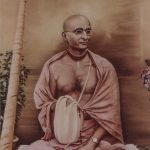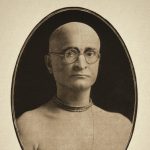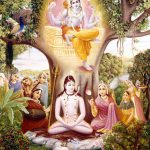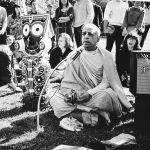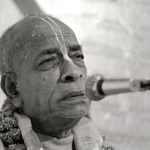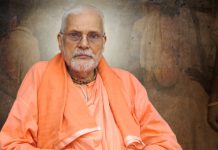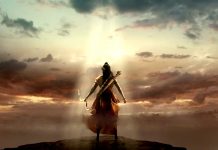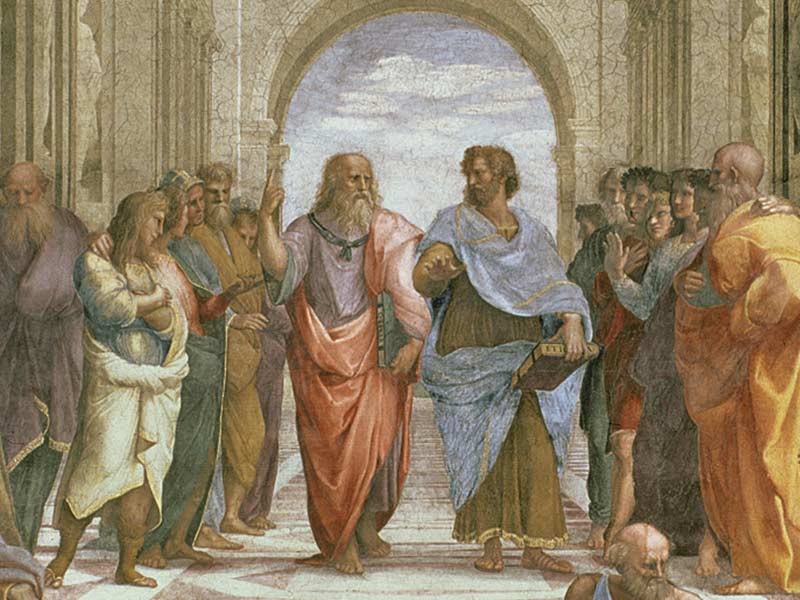 A lecture by HDG A.C. Bhaktivedanta Swami Prabhupada – excerpted from Dialectical Spiritualism: A Vedic View of Western Philosophy.
A lecture by HDG A.C. Bhaktivedanta Swami Prabhupada – excerpted from Dialectical Spiritualism: A Vedic View of Western Philosophy.
In Dialectical Spiritualism (book in manuscript), Srila Prabhupada examines with his disciples the ideas of the West’s major philosophers. What follows is taken from his discussions about Socrates.
Devotee: Socrates strongly opposed the Sophists, a group of speculators who taught that the standards of right and wrong and of truth and falsity were completely relative, being established solely by individual opinion or social convention. Socrates, on the other hand, seemed convinced that there was an absolute, universal truth or good, beyond mere speculation and opinion, that could be known clearly and with certainty.
Srila Prabhupada: He was correct. For our part, since we accept Krsna, God, as the supreme authority, the Absolute Truth, we cannot refute what He says. Krsna, or God, is by definition supreme perfection, and philosophy is perfect when it is in harmony with Him. This is our position. The philosophy of this Krsna consciousness movement is religious in the sense that it is concerned with carrying out the orders of God. That is the sum and substance of religion. It is not possible to manufacture a religion. In Bhagavad-gita and Srimad-Bhagavatam manufactured religion is called kaitava-dharma, just another form of cheating. Our basic principle is dharmam tu saksad bhagavat-pranitam. The word dharma refers to the orders given by God, and if we follow those orders we are following dharma. An individual citizen cannot manufacture laws, for laws are given by the government. Our perfection lies in following the orders of God cent percent. Those who have no conception of God or His orders may manufacture religious systems, but our system is different.
Devotee: The Socratic dialectic usually sought gradually to arrive at an understanding of the essence of a particular moral virtue for example, self-control, piety, courage, or justice by examining proposed definitions for completeness and consistency. Socrates wanted to establish more than just a list of universal definitions, however. He tried to show that any particular virtue, when understood in depth, was not different from all the others. The unity of the virtues thus implied the existence of a single absolute good. The goal of life is to rise by means of the intellect to a realization of this absolute good. A person who had attained such knowledge of the good would be self-realized in that he would always do the good without fail. A soul who had thus realized the good was said to be in a healthy or sound state, or to have attained wisdom. Socrates’s name for the single absolute good was “knowledge.”
Could one say that Socrates was a kind of jnana-yogi?
Srila Prabhupada: Socrates was a muni, a great thinker. However, the real truth comes to such a muni by that process after many, many births. As Krsna says in Bhagavad-gita [7.19]:
bahunam janmanam ante
jnanavan mam prapadyate
vasudevah sarvam iti
sa mahatma su-durlabhah
“After many births and deaths, he who is actually in knowledge surrenders unto Me, knowing Me to be the cause of all causes and all that is. Such a great soul is very Hare.
These people are known as jnanavan, wise men, and after many births they surrender themselves to Krsna. They do not do so blindly, but knowing that the Supreme Personality of Godhead is the source of everything. However, this process of self-searching for knowledge takes time. If we take the instructions of Krsna directly and surrender unto Him, we save time and many, many births.
Devotee: Socrates terms his method maieutic, that is, like that of a midwife. He thought that a soul could not really come to knowledge of the good by the imposition of information from an external source. Rather, such knowledge had to be awakened within the soul itself. The teacher’s business is to direct, encourage, and prod a soul until it gives birth to the truth. The maieutic method therefore suggests that since the soul is able to bring the truth out of itself, knowledge is really a kind of recollection or remembrance. If so, then there must have been a previous life in which the soul possessed the knowledge it has forgotten. This suggests, then, that the soul (understood as something involving intelligence and memory) exists continuously through many lives and, indeed, is eternal. * (Scholars disagree about whether Socrates explicitly taught the doctrine of remembrance. Even if it was Plato’s doctrine, he clearly thought it inherent in Socrates’s maieutic itself.)
Srila Prabhupada: Yes, the soul is eternal. And because the soul is eternal, the intelligence, mind, and senses are also eternal. However, they are all now covered by a material coating, which must be cleansed. Once this material coating is washed away, the real mind, intelligence and senses will emerge. That is stated in the Narada-pancaratra: tat-paratvena nirmalam. The purificatory process takes place when one is in touch with the transcendental loving service of the Lord and is chanting the Hare Krsna maha-mantra. Caitanya Mahaprabhu said, ceto-darpana-marjanam: one must cleanse the heart. All misconceptions come from misunderstanding. We are all part and parcel of God, yet somehow or other we have forgotten this. Previously our service was rendered to God, but now we are rendering service to something illusory. This is maya. Whether we are liberated or conditioned, our constitutional position is to render service. In the material world we work according to our different capacities-as a politician, a thinker, a poet, or whatever. But if we are disconnected from Krsna, all of this is maya. When we perform our duty in order to develop Krsna consciousness, our duty enables liberation from this bondage.
Devotee: It is interesting that nowadays we find the kind of relativism taught by Sophists like Protagoras to be again very widespread. “If you believe it, then it is true for you.” Socrates took up the task of vigorously combating this position, trying to demonstrate by strong arguments that there must be an absolute truth that is distinguishable from the relative and that must be categorically acknowledged by everyone.
Srila Prabhupada: That is what we are also doing. The Absolute Truth is true for everyone, and the relative truth is relative to a particular position. The relative truth depends on the Absolute Truth, which is the summum bonum. God is the Absolute Truth, and the material world is relative truth. Because the material world is God’s energy, it appears to be real or true, just as the reflection of the sun in water emits some light. That reflection is not absolute, and as soon as the sun sets, that light will disappear. Since relative truth is a reflection of the Absolute Truth, Srimad-Bhagavatam states, satyam param dhimahi: “I worship the Absolute Truth.” The Absolute Truth is Krsna, Vasudeva. Om namo bhagavate vasudevaya. This cosmic manifestation is relative truth; it is a manifestation of Krsna’s external energy. If Krsna withdrew His energy, the cosmos would not exist. In another sense, Krsna and Krsna’s energy are not different. We cannot separate heat from fire; heat is also fire, yet heat is not fire. This is the position of relative truth. As soon as we experience heat, we understand that there is fire. Yet we cannot say that heat is fire. Relative truth is like heat because it stands on the strength of the Absolute Truth, just as heat stands on the strength of fire. Because the Absolute is true, relative truth also appears to be true, although it has no independent existence. A mirage appears to be water because in actuality there is such a thing as water. Similarly, this material world appears attractive because there is actually an all-attractive spiritual world.
Devotee: Socrates held that the highest duty of man was to “care for his soul,” that is, to cultivate that healthy state of soul which is true knowledge, the attainment of the good. When a man becomes fixed in such knowledge he will as a matter of course act correctly in all affairs, he will be beyond the dictates of the passions, and he will remain peaceful and undisturbed in every circumstance. Socrates seems himself to have attained such a state, as his own behavior at the time of his death illustrates. He seems to have realized knowledge of at least some aspect of the Absolute Truth, although we must add that he never spoke of it as a person or gave it a personal name.
Srila Prabhupada: That is the preliminary stage of understanding the Absolute, known as Brahman realization, realization of the impersonal feature. When one is further advanced he attains Paramatma realization, realization of the localized feature, whereby he realizes that God is everywhere. It is a fact that God is everywhere, but at the same time God has His own abode. Goloka eva nivasaty akhilatma-bhutah. God is a person, and He has His own abode and associates. Although He is in His abode, He is present everywhere, within every atom. Andantara-stha-para-manu-cayantara-stham. Like other impersonalists, Socrates cannot understand how God, through His potency, can remain in His own abode and simultaneously be present in every atom. The material world is His expansion, His energy (bhumir apo ‘nalo vayuh kham mano buddhir eva ca). Because His energy is expanded everywhere, He can be present everywhere. Although the energy and the energetic are nondifferent, we cannot say that they are not distinct. They are simultaneously one and different. This is the perfect philosophy of acintya-bhedabheda-tattva inconceivable simultaneous oneness and difference.
Devotee: Socrates held that ‘all the virtues are one thing-knowledge.” He saw goodness and knowledge as inseparable. This union of the two seems to reflect features of sattva-guna as described in the Bhagavad-gita.
Srila Prabhupada: Sattva-guna the mode of goodness, is a position from which we can receive knowledge. Knowledge cannot be received from the platform of passion and ignorance. If we hear about Krsna, or God, we are gradually freed from the clutches of darkness and passion. Then we can come to the platform of sattva-guna and when we are perfectly situated there, we are beyond the lower modes. In the words of Srimad-Bhagavatam 1.2.18-19:
nasta-prayesv abhadresu
nityam bhagavata-sevaya
bhagavaty uttama-sloke
bhaktir bhavati naisthiki
tada rajas-tamo-bhavah
kama-lobhadayas ca ye
ceta etair anaviddham
sthitam sattve prasidati
“By regular attendance in classes on the Bhagavatam and by rendering of service to the pure devotee, all that is troublesome to the heart is almost completely destroyed, and loving service unto the Personality of Godhead, who is praised with transcendental songs, is established as an irrevocable fact. As soon as irrevocable loving service is established in the heart, the effects of nature’s modes of passion and ignorance, such as lust, desire, and hankering, disappear from the heart. Then the devotee is established in goodness, and he becomes completely happy.”
This process may be gradual, but it is certain. The more we hear about Krsna, the more we become purified. Purification means freedom from the attacks of greed and passion. Then we can become happy. From the brahma-bhuta platform we can realize ourselves and then realize God. So before realizing the Supreme Good, we must first come to the platform of sattva-guna. goodness. Therefore we have regulations prohibiting illicit sex, meat-eating, intoxication, and gambling. Ultimately we must transcend even the mode of goodness through bhakti. Then we become liberated, gradually develop love of God, and regain our original state. Muktir hitvanyatha rupam. This means giving up all material engagements and rendering full service to Krsna. Then we attain the state where maya cannot touch us. If we keep in touch with Krsna, maya has no jurisdiction. Mayam etam taranti te. This is perfection.
Devotee: Socrates took the oracular gnothi seauton, “know thyself,” to enjoin “care of the soul.” Care of the soul. as we have seen. involved an intense intellectual endeavor, a kind of introspective contemplation or meditation. It gradually purified the self, detaching it more and more from the body and its passions. Thus through the contemplative endeavor entailed by “know thyself,” a person attained knowledge and self-control, and with that he also became happy.
Srila Prabhupada: Yes, that is a fact. Meditation means analyzing the self and searching for the Absolute Truth. That is described in the Vedic literatures: dhyana-vasthita-tad-gatena manasa pasyanti yam yoginah. Through meditation, the yogi sees the Supreme Truth (Krsna, or God) within himself. Krsna is there. The yogi consults with Krsna, and Krsna advises him. That is the relationship Krsna has with the yogi. Dadami buddhi-yogam tam. When one is purified, he is always seeing Krsna within himself. This is confirmed in Brahma-samhita [5.38].
premanjana-cchurita-bhakti-vilocanena
santah sadaiva hrdayesu vilokayanti
yam syamasundaram acintya-guna-svarupam
govindam adi-purusam tam aham bhajami
“I worship the primeval Lord, Govinda, who is always seen by the devotee whose eyes are anointed with the pulp of love. He is seen in His eternal form of Syamasundara, situated within the heart of the devotee.” Thus an advanced saintly person is always seeing Krsna. In this verse, the word syama means “blackish” but at the same time extraordinarily beautiful. Being the Supreme Personality of Godhead, Krsna is of course very beautiful. The word acintya means that He has inconceivable, unlimited qualities. Although He is situated everywhere, as Govinda He is always dancing in Vrndavana with the gopis. There He plays with His friends and sometimes, acting as a naughty boy, teases His mother. These pastimes of the Supreme Person are described in Srimad-Bhagavatam.
Devotee: As far as we know, Socrates himself had no teacher in philosophy. Indeed, he refers to himself as “self-made.” Do you believe that one can be self-taught’? Can self-knowledge be attained through one’s own meditation or introspection?
Srila Prabhupada: Yes. Ordinarily every-one thinks according to the bodily conception. If I begin to study the different parts of my body and seriously begin to consider what I am, I will gradually arrive at the study of the soul. If I ask myself, “Am I this hand?” the answer will be, “No, I am not this hand. Rather, this is my hand.” I can thus continue analyzing each part of the body and discover that all the parts are mine but that I am different. Through this method of self-study, any intelligent man can see that he is not the body. This is the first lesson of Bhagavad-gita [2.13]:
dehino ‘smin yatha dehe
kaumaram yauvanam jara
tatha dehantara-praptir
dhiras tatra na muhyati
“As the embodied soul continuously passes, in this body, from boyhood to youth to old age, the soul similarly passes into another body at death. The self-realized soul is not bewildered by such a change.”
At one time I had the body of a child, but now that body is no longer existing. Nonetheless, I am aware that I possessed such a body; therefore from this I can deduce that I am something other than the body. I may rent an apartment, but I do not identify with it. The body may be mine, but I am not the body. By this kind of introspection, a man can teach himself the distinction between body and soul.
As far as being completely self-taught, according to Bhagavad-gita and the Vedic conception, life is continuous. Since we are always acquiring experience, we cannot actually say that Socrates was self-taught. Rather, in his previous lives he had cultivated knowledge, and this knowledge was simply continuing. That is a fact. Otherwise, why is one man intelligent and another man ignorant? This is due to continuity.
Devotee: Socrates believed that through intellectual endeavor-meditation a person can attain knowledge or wisdom, which is nothing else but the possession of all the virtues in their unity. Such a person always acts in the right way and thus is happy. Therefore the enlightened man is meditative, knowledgeable, and virtuous. He is also happy because he acts properly.
Srila Prabhupada: Yes, that is confirmed in Bhagavad-gita 18.54. Brahma-bhutah prasannatma na socati na kanksati: when one is self-realized, he immediately becomes happy, joyful (prasannatma). This is because he is properly situated. One may labor a long time under some mistaken idea, but when he finally comes to the proper conclusion, he becomes very happy. He thinks, “Oh, what a fool I was, going on so long in such a mistaken way.” Thus a self-realized person is happy. Happiness means that one no longer has to think of attaining things. For instance, Dhruva Maharaja told the Lord, svamin krtartho ‘smi varam na yace: “I don’t want any material benediction.” Prahlada Maharaja also said, “My Lord, I don’t want material benefits. I have seen my father-who was such a big materialist that even the demigods were afraid of him-destroyed by You within a second. Therefore I am not after these things.” Real knowledge means that one no longer hankers. The karmis, jnanis, and yogis are all hankering after something. The karmis want material wealth, beautiful women, and good positions. If one is not hankering for what one does not have, he is lamenting for what he has lost. The jnanis are also hankering, expecting to become one with God and merge into His existence. The yogis are hankering after some magical powers to befool others into thinking that they have become God. In India some yogis convince people that they can manufacture gold and fly in the sky, and foolish people believe them. Even if a yogi can fly, there are many birds flying. What is the difference? An intelligent person can understand this. If a person says that he will walk on water, thousands of fools will come to see him. People will even pay ten rupees just to see a man bark like a dog, not thinking that there are many dogs barking anyway. In any case, people are always hankering and lamenting, but the devotee is fully satisfied in the service of the Lord. He doesn’t hanker for anything, nor does he lament.
Devotee: Through jnana, meditation, Socrates may have realized Brahman. Could he have also realized Paramatma?
Srila Prabhupada: Yes.
Devotee: But what about the realization of Bhagavan, Krsna? I thought that Krsna can be realized only through bhakti, devotion.
Srila Prabhupada: Yes, one cannot enter into Krsna’s abode without being a purified bhakta. That is stated in Bhagavad-gita [18.55]. Bhaktya mam abhijanati. “One can understand the supreme personality as He is only by devotional service.” Krsna never says that He can be understood by jnana, karma, or yoga. The personal abode of Krsna is especially reserved for the bhaktas, and the jnanis, yogis, and karmis cannot go there.
Devotee: What do you mean when you say that Krsna consciousness is the ultimate goal of life? Does this mean always being conscious of Krsna?
Srila Prabhupada: Yes, we should always be thinking of Krsna. We should act in such a way that we have to think of Krsna all the time. For instance, we are discussing Socratic philosophy in order to strengthen our Krsna consciousness. Therefore the ultimate goal is Krsna: otherwise we are not interested in criticizing or accepting anyone’s philosophy. We are neutral.
Devotee: So the proper use of intelligence is to guide everything in such a way that we become Krsna conscious?
Srila Prabhupada: That is it. Without Krsna consciousness, we remain on the mental platform. Being on the mental platform means hovering. On that platform, we are not fixed. It is the business of the mind to accept this and reject that, but when we are fixed in Krsna consciousness we are no longer subjected to the mind’s acceptance or rejection.
Devotee: Right conduct then becomes automatic?
Srila Prabhupada: Yes, as soon as the mind wanders, we should immediately drag it back to concentrate on Krsna. While chanting, our mind sometimes wanders far away, but when we become conscious of this, we should immediately bring the mind back to hear the sound vibration of Hare Krsna. That is called yoga-abhyasa, the practice of yoga. We should not allow our mind to wander elsewhere. We should simply chant and hear, for that is the best yoga system.
Devotee: Socrates could have avoided the death penalty if he had compromised his convictions. He refused to do this and so became a martyr for his beliefs.
Srila Prabhupada: It is good that he stuck to his point yet regrettable that he lived in a society in which he could not think independently. Therefore he was obliged to die. In that sense, Socrates was a great soul because although he appeared in a society that was not very advanced, he was still such a great philosopher.


